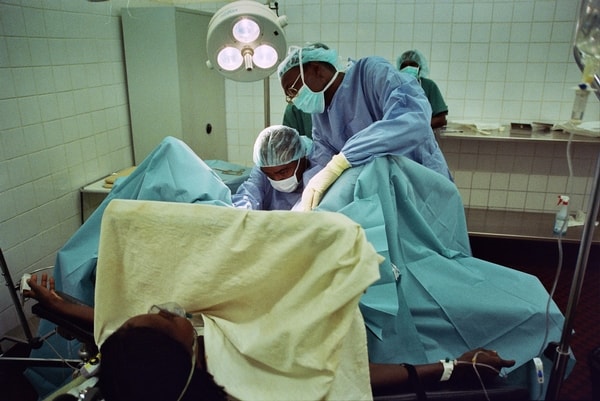An obstetric fistula is a hole between the vagina and the bladder or rectum, through which urine or stool leaks continuously. They are devastating injuries resulting from complicated childbirths, affecting more than two million women worldwide.
 @ P.K. Lee
@ P.K. Lee
Our healthcare teams work with pregnant women to prevent the occurrence of obstetric fistulas, while at the same time treating those with the condition and providing psychological support to fistula sufferers to help rebuild their lives.
In 2010, MSF surgical teams repaired fistulas for about 1,000 women.
While any woman can be susceptible to fistulas, most cases are found in African countries. It is largely a hidden problem, affecting young women who give birth at home in poor, remote areas with very limited or no access to maternal healthcare.
If a woman survives a complicated birth, and suffers a fistula as a result, she will often be shunned by her family and community. Because of this social exclusion, it is even less likely the sufferer will receive care.
Our healthcare teams work with pregnant women to prevent the occurrence of obstetric fistulas, while at the same time treating those with the condition and providing psychological support to fistula sufferers to help rebuild their lives.
In 2010, MSF surgical teams repaired fistulas for about 1,000 women.
What causes a fistula?
Almost all fistulas are caused by obstructed labour. In remote African regions, where there are few hospitals or midwives and obstetric care is scarce, complicated childbirth can result in a woman being in labour for days.
Without access to emergency Caesarean sections, these complications can be fatal. However, if the woman survives the labour, permanent injuries to the birth canal often result.
During childbirth, the delivery of a baby may stop because the head of the child is too big or the pelvis of the mother is too small. A delivery may also stop because the uterus is not contracting properly.
As the baby’s head presses against one part of the birth canal, the surrounding tissue eventually dies and creates a hole, or a fistula – an abnormal connection between the vagina and the bladder, the vagina and rectum, or both.
This hole will never heal naturally and, more often than not, the baby will be stillborn, adding yet more suffering for the mother.
While very rare, our surgeons have also witnessed a small number of fistula cases resulting from extreme sexual violence.
Symptoms of a fistula
Because of the abnormal opening to the bladder or rectum, a woman suffering from a fistula will constantly leak urine or faeces through her vagina. The leaked fluids cause an unpleasant smell and can cause ulcers or ‘burns’ on the woman’s legs.
Women often reduce their fluid intake drastically to try and reduce the flow of urine, which can result in kidney disease and bladder stones.
In most cases, women with fistulas develop psychological symptoms. Because of the physical symptoms, they are often ostracised by their community and abandoned by their husbands, who will take another “healthy” wife.
Due to the birthing complications, women in some cases suffer nerve damage as well, causing paralysis in one or both of the woman’s legs, or leaving her with difficulties in flexing her feet – a condition called drop foot.
These problems can further isolate a woman which, in turn, can lead to malnutrition due to her exclusion from society.
Treating a fistula
With good obstetric care, fistulas are preventable; in developed countries, fistulas have all but disappeared.
In some cases, a simple repair may take only 45 minutes to complete, but many cases are more complex and require several operations by highly skilled surgeons. Only a few institutions in Africa teach these specialised surgical skills.
After the operation, the patient will need a bladder catheter for a couple of weeks and will be taught pelvic floor exercises to strengthen her muscles.
Thankfully, women who have had a fistula repaired are able to have a healthy child in the future, if they receive appropriate antenatal care.
Training local midwives to help mothers give birth safely is vital. They can spot whether a mother is having difficulty giving birth and can arrange help before it is too late.
Total treatment, however, goes beyond the surgical aspect. Because of the stigma attached to fistulas, MSF teams also provide psychological and psychosocial aftercare to help reintroduce fistula sufferers back into their communities.
Today, MSF treats obstetric fistulas in three permanent centres in Burundi, Chad and Nigeria.
The number of patients treated by MSF teams has been steadily rising: from approximately 100 repairs in 2006, to between 400 and 500 repairs in 2009, and then about 1,000 in 2010.
Fistula facts
-
Of the hundreds of thousands of women who die during pregnancy or childbirth each year, 90 per cent live in Africa and Asia.
-
An obstetric fistula is a hole between the vagina and the bladder or rectum, through which urine or stool leaks continuously.
-
Fistulas are caused by complications during childbirth. Tissue in the birth canal dies, creating an abnormal connection between the vagina and the bladder, the vagina and rectum or both.
-
The condition causes damaging psychological problems as well as physical pain. Women are often shunned by their communities due to the stigma associated with fistulas.
-
MSF repaired about 1,000 fistulae in 2010 and treats the disorder in three permanent centres in Burundi, Chad and Nigeria.











